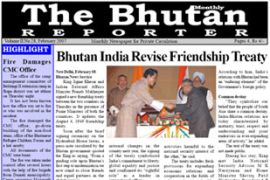Aid offered to save Bhutan paper
World Association of Newspapers responds to aid request to keep local paper going.

Thakur Mishra, editor of the Bhutan Reporter, said that the support offered by WAN was appreciated.
“The Bhutan Reporter team is committed to its publication despite several challenges. I would like to extend sincere thanks to WAN for their supportive response,” he said.
Access to information
The Bhutan Reporter, with a print run of 1,000, is published by the Bhutan Media Society, the publishing house of the Association of Press Freedom Activists (APFA) in Bhutan.
| Bhutan: The ancient kingdom |
|
Located between China and India
About 100,000 Bhutanese live in seven UN Refugees camps in Nepal.
Many are ethnic Nepali who had migrated to Bhutan but were then forced out, leaving them stateless and stranded for nearly 20 years
One government newspaper, The Kuensel, and two private papers, one government-owned television station and several radio stations. Until the early 1990s, there was no local television station.
A 1989 royal decree mandated that antennas be dismantled, in effect blocking foreign television. |
The newspaper is uploaded to the internet but the majority of refugees in the camps cannot access it because they are not online, so paper versions are still needed.
Mishra said publishing hard copies of the newspaper was the best way to reach its target audience.
“We need to find a way to ensure
that the people living in the refugee camps, especially those who do not have internet access, can still exercise their right to information.”
He said it was important the paper survived.
“The media situation inside Bhutan is strictly under government threat.
“Organisations like APFA-Bhutan, established in the refugee camps, are trying to bring Bhutan‘s suppressed media in the international arena.”
Staff members at the paper say that 2,000 Nepalese rupees ($28) would be enough to ensure the paper continues to print each month, and 14,000 rupees ($196) would let them turn it into a weekly publication.
For more information about Media Helping Media click here.